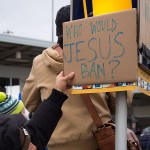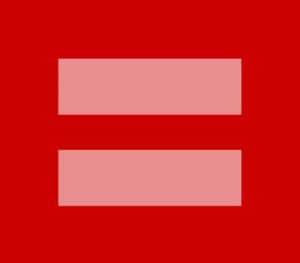 I did it. You probably did it. Everyone was doing it. Changing their profile picture to the red version of the Human Rights Campaign logo last week as a statement of support for marriage equality as lawyers argued against California’s Proposition 8 and the federal Defense of Marriage Act before the justices of the Supreme Court of the United States.
I did it. You probably did it. Everyone was doing it. Changing their profile picture to the red version of the Human Rights Campaign logo last week as a statement of support for marriage equality as lawyers argued against California’s Proposition 8 and the federal Defense of Marriage Act before the justices of the Supreme Court of the United States.
The Huffington Post shared a fascinating image of the United States showing the prevalence of Facebook avatar changes by county.
What can we see below:
“The well-known geographic divides are apparently: same-sex marriage gets more support in the more liberal Northeast and West, less in the South. Additionally, Facebook found that 30-year-olds were the most likely to change their profile picture, with around 3.5 percent doing so. The data also showed that, unsurprisingly, those living in college towns were the most likely to change their profile pictures. Sure, it’s great that people feel comfortable to publicly show their support for such an important issue, but does changing your profile picture really make a difference? Maybe.”
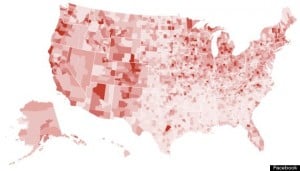 Whether this symbolic action makes a difference is something that other folks have written about. I do know that for a lot of the young people with whom I am friends on Facebook, largely current and former students, people under the age of 30, it seemed to matter. Especially for those who are finding their way out into an often hostile world, any show of support matters.
Whether this symbolic action makes a difference is something that other folks have written about. I do know that for a lot of the young people with whom I am friends on Facebook, largely current and former students, people under the age of 30, it seemed to matter. Especially for those who are finding their way out into an often hostile world, any show of support matters.
But there is another side to the story that’s not easily captured in a color coded logo. Namely, there’s this thing called homonationalism. A brief definition:
“Homonationalism occurs when sub-sectors of specific gay communities achieve legal parity with heterosexuals and then embrace racial and religious supremacy ideologies.”
Think about who the ‘acceptable gays’ are in the media these days: white couples with disposable income, wrapping themselves in the flag of the U.S.A. and claiming their rightful space in courts of law as well as religious communities. We’re just like you!
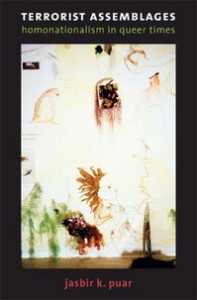 The problem is that what “we” are isn’t always that great. Last spring, my Advanced Feminist Theories students and I worked our way through Jasbir Puar’s Terrorist Assemblages: Homonationalism in Queer Times. Puar is credited with innovating this term, and the book is a dense but innovative work identifying a whole range of issues with the current gay rights movement. This accessible excerpt from a great tumblr piece offers explanation of “red logo resistance.” The author points out that support for marriage equality isn’t the issue (though there are problems with this rhetoric too). The issue is all of the people the HRC and its campaign leave out:
The problem is that what “we” are isn’t always that great. Last spring, my Advanced Feminist Theories students and I worked our way through Jasbir Puar’s Terrorist Assemblages: Homonationalism in Queer Times. Puar is credited with innovating this term, and the book is a dense but innovative work identifying a whole range of issues with the current gay rights movement. This accessible excerpt from a great tumblr piece offers explanation of “red logo resistance.” The author points out that support for marriage equality isn’t the issue (though there are problems with this rhetoric too). The issue is all of the people the HRC and its campaign leave out:
So I know that when I look at my facebook wall and I see fifteen little “equals” signs, I’m supposed to feel happy. I’m supposed to pat my liberal friend group collectively on the back and feel good about the progress that society is making. I’m supposed to be grateful that after all the years of hard work and all the billions of dollars spent on the gay marriage campaign, America is finally coming around.
But I actually feel sad and more than a little angry. Okay, a lot angry. Folks, the HRC is an organization run by rich white men. They have consistently chosen not to support trans rights. They have consistently silenced POC organizations and organizers. They have accepted donations from, and even honored, multi-billionaire corporations who have done more than their fair share to contribute to the unequal distribution of wealth and to systematic racialized and gendered oppression in the US. Their vision of “equality”—as obviously signaled by their logo—is not, and never has been, equality for all. It is equality for those who can afford it. It’s equality for those who can prove they are “just like everyone else,” who respect and embody gender normativity, middle class sensibility, and white supremacy. It’s equality for those who don’t care about coalitional politics, and who endorse both trickle down economics and trickle down civil rights.
So when I see a cascade of HRC logos as far as I can see, and then a ton of self-congratulatory back-patting on the internet, like way to go, internet America! You’ve seen the light! You’re finally making progress! I think about all the queer people of color, and the trans and genderqueer people, who are being told in no uncertain terms: your rights mean less than ours. Your alienation means less than our visibility. We’ll come back for you later. Wait your turn. Which, hmm, sounds like the same song that’s been sung ever since the HRC, and organizations like the HRC, essentially co-opted the possibility of a radical queer social movement and turned it into a mainstream machine for maintaining the status quo.
Full confession here, folks: I changed my Facebook profile picture for two days. I have given money to the Human Rights Campaign. I wear the “Love Conquers Hate” t-shirt I got from their online shop. And I do think that striking down Prop 8 and DOMA are good things.
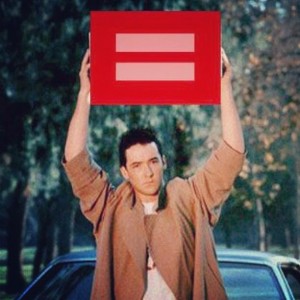 But … I know there are serious ways that campaigns for marriage equality are trading on tropes of racial, religious, and yes even hetero-normativity. They end up using whiteness, monogamy, beauty myths, and even religion to claim legitimacy. And in doing so, the campaign is reinscribing those norms. So I keep reading, assigning these texts to my students, insisting that we listen and learn from those who are still being marginalized. I know that it’s not enough.
But … I know there are serious ways that campaigns for marriage equality are trading on tropes of racial, religious, and yes even hetero-normativity. They end up using whiteness, monogamy, beauty myths, and even religion to claim legitimacy. And in doing so, the campaign is reinscribing those norms. So I keep reading, assigning these texts to my students, insisting that we listen and learn from those who are still being marginalized. I know that it’s not enough.
I know that moving one (sub)group to the center still means that someone is left on the margin.
Derrick Clifton over at The Huffington Post has more on all of this, and concludes:
“When people openly express their discomfort about the red HRC logo heavily populating their Facebook and Twitter news feeds, they’re doing more than simply raging against the Gay Inc. machine. … If anything, it’s a plea for recognition that the marriage issue is one part of a larger strategy for equality and not the ultimate end goal. … It’s a plea that people who still require and desire more than marriage equality won’t be forgotten about.”
Let’s remember that the next time we get carried away.
The Center for Lesbian and Gay Studies is hosting a conference, Homonationalism and Pinkwashing, in New York City April 10-11, 2013. Though it’s sold out now, there are links for streaming video from the sessions, as well as other resources, on their website.
h/t to my Facebook friend Jay for sharing the initial tumblr piece I quote above.
Say Anything/logo image via






